My mom grew up on a reservation enduring many hardships, including confinement, withholding food and healthcare, degrading and ridicule, and being told she was less than human from outsiders. However, my mom also shared stories of how women gathered together to plant, help one another, harvest, and celebrate. She talked about their wisdom and their voice to help lead the tribe. My mom’s experiences within the tribe were in great contrast to how they were treated by the “civilized” people who overtook them.

Native Women Helped Form Women’s Rights
Although Native Americans inhabited North America before the colonial people, they were deemed savages or non-humans. Finally, in 1924 The Indian Citizenship Act granted US citizenship to the indigenous peoples of the United States. During this time, several colonial women observed significant differences in how Native American women were treated in the tribe and how they were treated in their community.
Native American tribes traditionally valued women for their ability to bring life, wisdom, healing, and balance. Many tribes gave women equal or a higher value, independence, and authority depending on the tribe and their traditions. These facts are contrary to how Native American women have been portrayed in stories and movies.
The colonial women who spent time with Native women were inspired by their voice, authority, and value among their community and with the men in their tribe. The wisdom the colonial women discovered paved the way for them to create the Women’s Rights Movement, as stated in the article by Sally Roesch Wagner, How Native American Women Inspired the Women’s Rights Movement.
“The Six Nation Haudenosaunee Confederacy had, and still have today, a family/governmental structure based on female authority. Haudenosaunee women controlled the economy in their nations through their responsibilities for growing and distributing the food. They had the final authority over land transfers and decisions about engaging in war. Children came through the mother’s line, not the father’s, and if the parents separated, the children stayed with their mother, and if she died, with her clan family. Women controlled their own property and belongings, as did the children. Political power was shared equally among everyone in the Nation, with decisions made by consensus in this pure democracy, the oldest continuing one in the world.
Still today, the chief and clan mother share leadership responsibilities. The clan mother chooses and advises the chief, placing and holding him in office. These men, appointed by the women, carry out the business of government. The clan mother also has the responsibility of removing a chief who doesn’t listen to the people and make good decisions, giving due consideration to seven generations in the future. To be chosen as a chief, the man cannot be a warrior (since it is a confederacy based on peace), nor can he have ever stolen anything or abused a woman. Women live free of fearing violence from men. The spiritual belief in the sacredness of women and the earth—the mutual creators of life—make rape or beating almost unthinkable. If it occurs, the offender is punished severely by the men of the victim’s clan family – sometimes by death or banishment.”
Ms. Wagner’s findings encouraged her to change the lives of women by creating women’s rights within a democratic leadership. I salute all the Native American women who came before me, my mom, grandma, great-grandma, and great-great-grandma. Without their courage and example, where would we be?
Jesus also Advocated for Women’s Equality
Jesus stood against the culture and the religious sects many times to minister and empower women during his three-year ministry. The first-person Jesus revealed himself to as the Messiah was a Samaritan woman. A less-than. A woman no Jewish man would talk to or even think about helping. Yet Jesus revealed his truth in love and brought healing and liberation to her.
Jesus put his life on the line for an adulterous woman. He asked the group of men surrounding her, “He who is without sin, cast the first stone.” After everyone had left, Jesus forgave her sins and also brought healing to her life. Jesus makes it clear that women have equal value with men.
Take Time to Celebrate an Older Woman
Although women and men have different physical, mental, and psychological differences, God created them to complement and be each other’s helpmates. As we approach women’s history month, let us remember all the women who have paved the way, whether well-known or behind the scenes. All the women who have gone before us have contributed to the voice and freedoms we women currently enjoy. Take time to thank an older woman for all she has done for the people in her life. Help her see her value and that she has made a difference!





